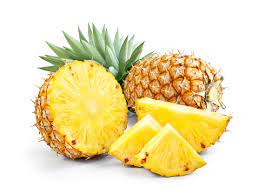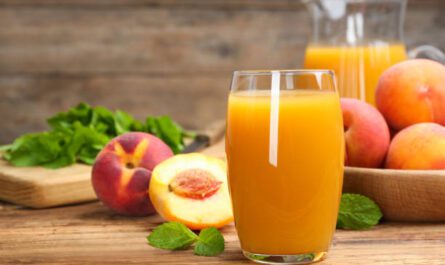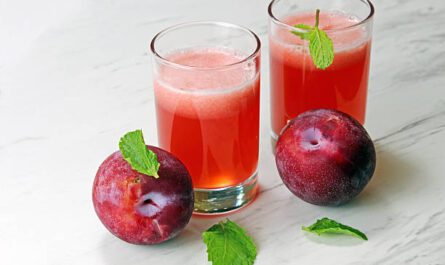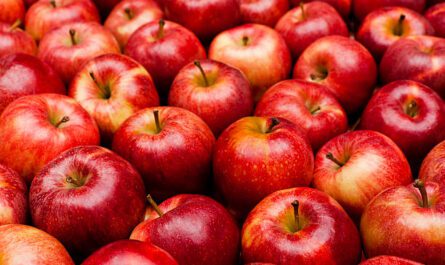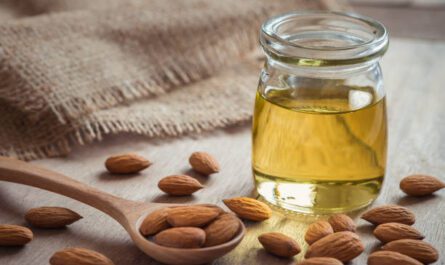Nutritional Benefits of Eating Pineapple for Health
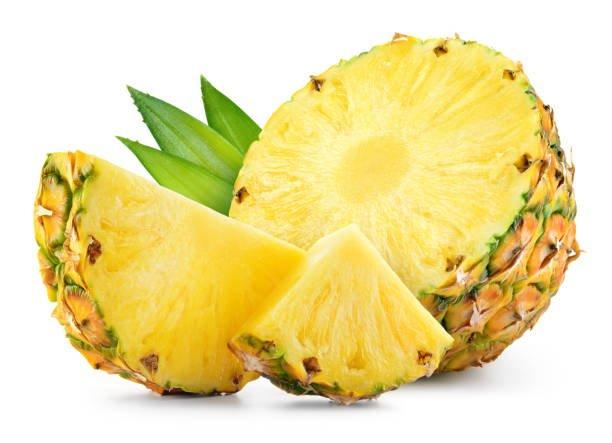
Health Benefits of Pineapple are that it is rich in nutrients. It is essential for our health, protecting us from many diseases. Nature has blessed humans with numerous delicious and nutrient-rich. It is also one of those fruits that are very beneficial for health. It contains plenty of nutrients and healthful compounds, such as vitamin C, manganese, and enzymes, to help aid digestion. The fresh or roasted ripe pineapple may help boost immunity, lower cancer risk, and improve recovery time after surgery.
History:
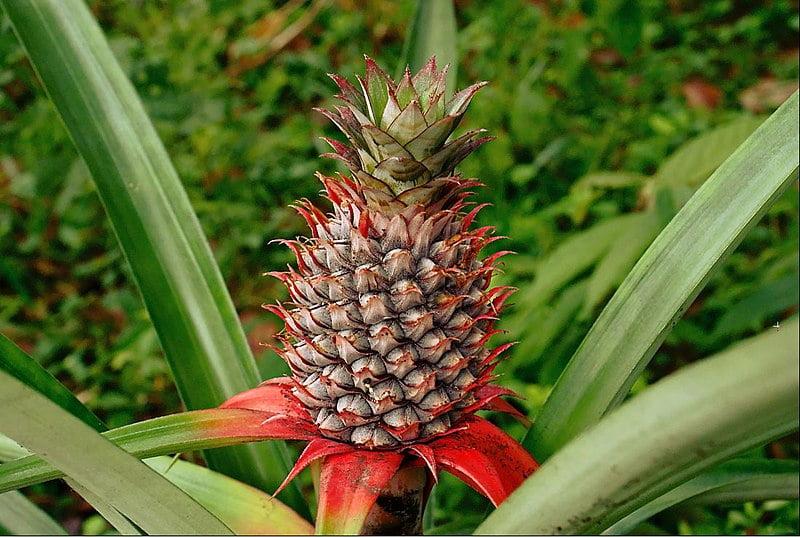
This is the fruit of a plant called “pineapple.” In English, it is called pineapple, a fruit native to South America. Like many crops and fruits, the Portuguese took them to other countries, and now they are grown almost worldwide. People all over the world love to eat pineapple and enjoy its benefits. It has a unique aroma and a tasty, excellent fruit.
The pineapple, home to a solid wood-like shell, is native to South America. It originated in South America, where early European explorers named it pineapple because it resembled pineapple and were the first to grow it. It began but was discovered by the British in the Caribbean in 1493, and they took it to Europe. Trusted source
Columbus introduced the delicious pineapple fruit to Europe. They are mainly found in Australia and South Africa. In the 16th century, the Portuguese and Spanish cultivated these in Asian countries. Due to pineapple’s highly valued health benefits and delicious taste, it soon became the hallmark of emperors and the adornment of their homes. In the 18th century, China, Brazil, and Mexico began enjoying the numerous benefits and sweetness of pineapple.
Types and textures of Pineapple:

The importance and types of pineapple which is a delightful, fragrant, sweet-tasting, juicy, and colourful fruit. Lying in the fruit looks beautiful and prominent. It is a sweet, sour and delicious fruit. Its temperament is cold and wet, and it is second-class.
They come in many varieties and different colours and sizes but are similar in nutrition. Some have large leaves and small fruits, and some have small leaves and large fruits. It is dark yellow, green and light yellow on the outside, orange, red, pink, brown, green and dark yellow, green and orange on the inside, and the pulp is creamy white, bright yellow, reddish and red on the inside.
Queen pineapples are dark yellow with small leaves, and big fruits are fragrant and beautiful. They are more tolerant of diseases and cold temperatures than other pineapples. The “red Spanish pineapple” is reddish-orange grown in the Caribbean. The greenish-yellow colour on the outside indicates that it is fully ripe.
This is because pineapples gradually turn green to yellow after ripening and do not ripen after being picked from the plant. Fresh and fully ripe pineapples have green, shiny and healthy leaves. At the same time, these vegetables are also yellowish-yellow. Like other fruits, the texture of pineapple can help determine whether it is fully ripe or raw. Ripe pineapple peel is hard to see while cut or squeezed slightly softer. The characteristic of unripe pineapple is that it is completely solid or hard. Trusted source
Pineapple Nutrition:
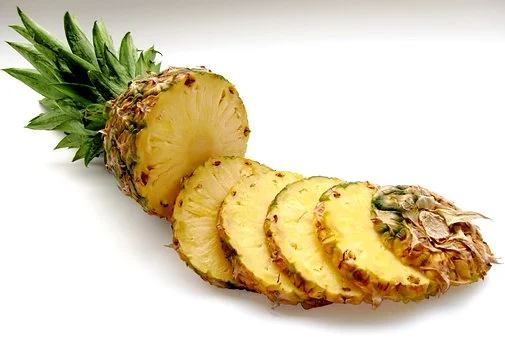
It is a fruit that is useful for immense strength and health. Medical experts say that regular consumption of pineapple protects a person from obesity. It is a delicious fruit that also has the natural power to protect against the attack of many diseases. Medical experts say that eating it can cure internal injuries and wounds. It is a beneficial fruit for health. Trusted source
Enzymes, bromelain, antioxidants, and vitamin C quickly heal liver and stomach ulcers. This delicious fruit is also beneficial for sore throat and joint pain. The presence of vitamin C in this fruit boosts the immune system. It is low in calories but has an incredible nutritional value that is highly beneficial for health.
There are 83 calories in 165 grams of pineapple. It is cholesterol and fat-free and rich in vitamins A, B and C. In addition to adequate amounts of potassium and copper, it contains dozens of minerals and compounds with health benefits. USDA
Nutrition:
| Nutritional value per 100 g (3.5 oz) | |
|---|---|
| Energy | 209 kJ (50 kcal) |
Carbohydrates | 13.12 g |
| Sugars | 9.85 g |
| Dietary fiber | 1.4 g |
Fat | 0.12 g |
Protein | 0.54 g |
| Vitamins | Quantity %DV† |
| Thiamine (B1) | 7% 0.079 mg |
| Riboflavin (B2) | 3% 0.032 mg |
| Niacin (B3) | 3% 0.5 mg |
| Pantothenic acid (B5) | 4% 0.213 mg |
| Vitamin B6 | 9% 0.112 mg |
| Folate (B9) | 5% 18 μg |
| Choline | 1% 5.5 mg |
| Vitamin C | 58% 47.8 mg |
| Minerals | Quantity %DV† |
| Calcium | 1% 13 mg |
| Iron | 2% 0.29 mg |
| Magnesium | 3% 12 mg |
| Manganese | 44% 0.927 mg |
| Phosphorus | 1% 8 mg |
| Potassium | 2% 109 mg |
| Sodium | 0% 1 mg |
| Zinc | 1% 0.12 mg |
| Other constituents | Quantity |
| Water | 86.00 g |
| |
| †Percentages are roughly approximated using US recommendations for adults. | |
It is also rich in vitamins A and K, Phosphorus, Zinc, and Calcium. The food rating system, these healthy ingredients are a means of protection against many diseases. American Center for Agricultural Research, 250 grams of pineapple (without sugar) contains 132 calories, one gram of protein, 32 grams of carbohydrates, 25 grams of sugar, and half a gram of fiber. One cup of it meets 65% of the daily magnesium requirements of adults. In addition, 42% of vitamin C is sufficient for everyday needs. At the same time, folate meets 10% of vitamin B6 and thiamine.
It tastes sour and sweet. Its jams, juices, and jams are prevalent. It contains many minerals and vitamins. That is why it is counted among the invigorating fruits. Trusted source
Pineapples are antioxidants:
Nutritional Benefits of Eating Pineapple. istockphoto
It is a delightful fruit that is growing in popularity every day. It has enormous power and numerous health benefits. It is rich in vitamins, minerals, antioxidants, and other essential ingredients. It is valuable and beneficial for health in many ways. It has long been used to treat inflammation and illness. Its juice awakens the body’s natural defense system, which fights diseases.
This is called the security system. In this regard, an experiment was conducted on school children in the Philippines who were given canned pineapple daily. It was found that this protected the children from bacteria (germs) and reduced their recovery time after the disease.
Although there are about 100 varieties of pineapple, only eight varieties are cultivated and sold due to their usefulness. Pineapple, as an antioxidant, saves the body from harmful substances. Vitamin C is also helpful in this regard. It is also beneficial in colds and flu, and now it has discovered enzymes that can kill germs that make drugs ineffective.
Australian experts have successfully used it to treat diarrhoea in some mammals, raising hopes that pineapple can defeat human bacteria. Melbourne’s Trobe University research shows that the indiscriminate use of antibiotics makes these bacteria resistant to all types of drugs.
Doctors are also prescribing antibiotics relentlessly, thus transforming the bacteria into “superbugs”. Do experts believe that germs worldwide are cleverly inactivating antibiotics, but the key ingredients in it can win this battle? A recent one-year survey estimates that by 2050, the number of deaths from antibiotic-resistant germs and bacteria could exceed 10 million yearly.
To win this battle, we must develop new antibiotics or discover natural ingredients to help us defeat these germs. Experts say three enzymes found in pineapple have been shown to cure diarrhoea by eliminating bacteria in the intestines of animals. Thus, a new way of treating diarrhoea can be opened. These three enzymes are collectively called “bromelain” by experts and were discovered 80 years ago. Trusted source
Best Health Benefits of Peaches
Pineapple is beneficial for the heart:
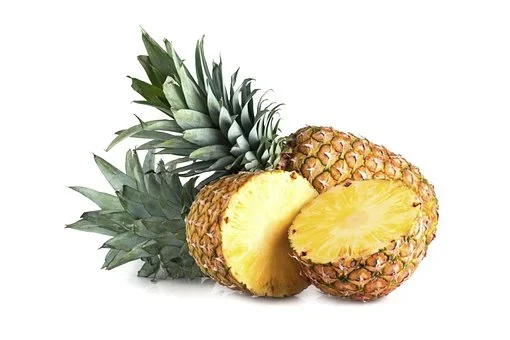
The benefits of pineapple for our health. It is a super and beneficial fruit that helps regulate our nervous system. It contains many vitamins and minerals that have many benefits for our health. This tropical fruit also has many benefits for heart health. It is naturally sweet and flavorful, so eating it once a day keeps the heart healthy.
The nutrients in pineapple have various health benefits for the heart:
It is very beneficial for our health. It is a delicious fruit familiar to everyone worldwide and probably a favourite of many people. This tropical fruit is found in almost every grocery store. It is considered a staple fruit in many homes around the world.
Due to pineapple’s excellent nutritional properties and numerous health benefits, it is also used as a healthy snack or dessert. A one-cup serving (165 grams) provides just 75 calories and 0% of your DV for cholesterol, salt, and fat. It is considered to have various benefits for the heart, liver, skin, hair, bones, etc., due to its rich nutrition and health benefits. Following of The nutrients in pineapple have various health benefits for the heart:
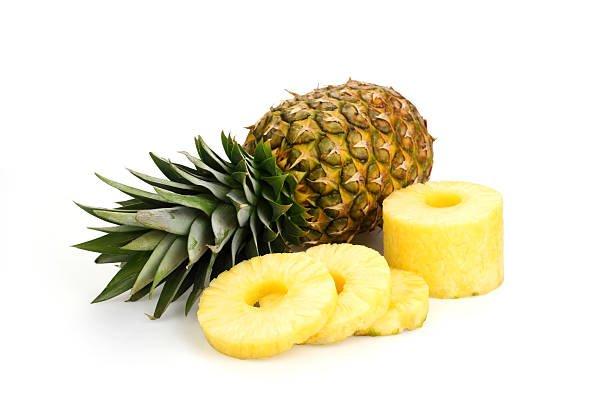
1. Effect of Vitamin C” on Heart Health:
Our immune system depends on antioxidants like vitamin C, which is essential and beneficial in heart health. These supplements reduce the risk of heart disease by lowering bad Cholesterol (LDL). With 78.9 milligrams per cup, pineapple is a high vitamin C source, contributing to incredible heart health benefits.
2. Improve blood flow:
An enzyme called bromelain, found naturally in pineapples can help your heart. This chemical helps break down cholesterol plaques. As a result, it improves blood flow throughout the body and heart and reduces the risk of stroke or heart attack. Bromelain also inhibits blood platelet aggregation and blood clotting. As a common natural source of bromelain, pineapple should be included in your regular diet for heart health.
3. Fiber and heart:
A fibre-rich diet lowers LDL cholesterol levels, as does vitamin C. Helps regulate blood sugar levels and keep you fuller for longer, curbing unhealthy food cravings that can damage heart health. One serving of pineapple contains about 2.3 grams of fibre. It is 10 per cent of the recommended daily requirement. Although It has many health benefits for the heart, you should consult a cardiologist, especially if you suffer from heart problems.
Pineapple is good for the brain:
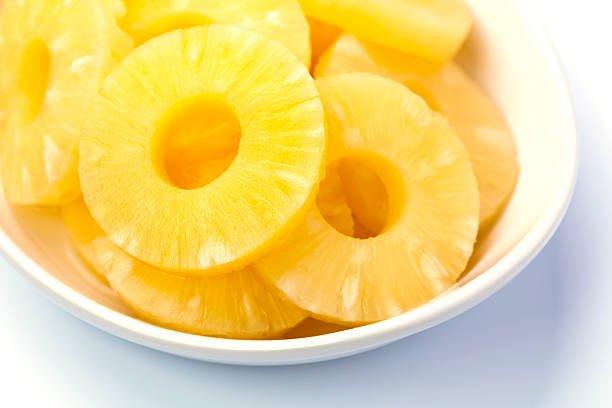
Pineapple is a fruit with immense health benefits. It contains various beneficial vitamins which help us deal with mental stress. So, people suffering from anxiety should make it a part of their diet as it benefits health. It is rich in amino acids. Tryptophan allows our body to produce serotonin, the happy hormone. It is also a source of happiness, and it is also soothing. This fruit either kills or controls certain types of cancer cells, causing them to shrink in size. It is a powerful fruit for gum tissues, making them clean and robust, and it helps get rid of oral cancer. It is also beneficial in the fight against cancer.
Pineapple is helpful for cancer:
Some studies have named pineapple the best fruit for human health. It contains a unique compound called “bromelain”. These compounds are obtained from both stems and fruits. In the treatment of certain types of cancer, doctors recommend bromelain as a dietary supplement, which prevents cancer and reduces inflammation. These “free radicals” accumulate in the airways and enter the intestines, leading to colon cancer. Vitamin C in Pineapple helps fight cancer.
Bromelain is also sold in capsule form to relieve inflammation, wounds and other ailments after surgery. An experiment has shown that fresh pineapple juice prevents cancer. Its pulp and root juice avoid the spread of cancer in the uterus and intestines. A Harvard University study reported that beta-carotene in pineapple is a unique component that can protect against various cancers, including prostate and colon cancer.

Strengthens the immune system:
Manganese in pineapple helps enzymes in energy production. Cells that produce energy also suffer from internal damage. It improves its function by scavenging free radicals and vitamins. Research by the Food and Drink Association shows that vitamin C in pineapple strengthens the body’s immune system and protects cells from damage. Bromelain prevents blood clotting and helps regulate blood flow.
Useful in respiratory, throat and allergy:
Vitamin C and bromelain help eliminate mucus in the nose and throat. Those suffering from climate allergies should include pineapple in their diet. This will help maintain respiratory tract health and deal with allergies. It is also beneficial for eliminating various unhealthy glands in the body.
Some people’s throats become swollen due to an enlarged thyroid gland. This narrows the oesophagus and makes it challenging for some to eat or drink. This condition is called the thyroid gland. This is due to iodine deficiency. It is beneficial in this disease. Its use reduces the swelling of the ducts.
Useful for eyes:
The research has shown that an adequate amount of pineapple helps maintain vision in youth and old age, and it also reduces the breakdown of the body with increasing age. In ophthalmology, eating it three times daily helps restore eyesight. We know that vitamin C reduces cataracts in the eyes in many ways. Experts have studied the relationship between vitamin C and cataracts in 1000 UK twins. Therefore, it is instrumental in preventing cataracts. Another significant benefit of pineapple is that it helps sharpen eyesight, and regular use prevents impaired vision.
Beneficial for bones and joints:
It is a vitamin C-rich fruit, with a glass of juice providing the body with the total amount of vitamin C and protecting the human body from a wide range of viruses. This fruit also plays an essential role in strengthening the bones. Its daily consumption provides the required amount of magnesium to the bones, which helps maintain the bones and benefits the digestive system.
Medical experts say that it should be eaten between meals to maximize benefits. It is extremely helpful in jaundice. In effect, it is cold. It is also beneficial in joint pain. Adequate amounts of manganese are good for bones and connective tissue, so drinking one cup of pineapple juice is enough to meet 70% of the daily requirement.
Useful in digestion:
It includes enzymes that help improve our digestive system and speed up digestion. They also contain enzymes that help digest protein. It contains bromelain, a critical enzyme that breaks down protein and improves digestion. Therefore, you can get plenty of vitamin C if you drink a cup of pineapple or its juice every morning before going to school, college, university or office. It is also an excellent source of iron and calcium.
For skin and hair:
The use of pineapple makes the skin glow. It eliminates the burning sensation in the body and increases the collagen, which is very beneficial for our skin. It also makes the skin soft and supple while giving radiance to the skin. The presence of vitamin C and beta carotene makes it a best skin friend. Many of the antioxidants in it prevent skin breakouts, wrinkles and burns.
It strengthens hair roots. If you want to make your hair thicker and longer, mix pineapple juice, olive oil and almond oil and mix it well. Then, after applying this mixture to the hair for 10 minutes, wash it. Do this process 2 to 3 times a week, and in a few weeks, you will be amazed at the result and surprised at how long, thick and shiny your hair has become. Are
Beneficial for the bladder:

It does not raise blood pressure much and is helpful in joint pain. It is also beneficial in kidney and shoulder pain. Using it opens urine, and harmful substances, stones, etc., are removed from the body. Its sweetness is slightly sour. If there are tumours in the body, regular use of pineapple can eliminate them.
Pineapple is an energetic and healthy fruit:
It has excellent sources of health benefits. Some people consider it a fruit that generates heat in the body, but that is not the case at all. However, this fruit is very healthy and has numerous benefits for our health.
More health benefits of the nutritional fruit of pineapple can be found by reading the following reasons.
1- For solid heart health:
2- It strengthens the liver and stomach.
3- It is slowly digested.
4- It is helpful for hot-tempered people. It is a diuretic.
5- This antidepressant.
6- It removes bile heat and is beneficial for jaundice.
7- Ripe Pineapple is rich in vitamin C and contains carbohydrates, vitamin A, calcium, and protein.
8- It is a diuretic that removes sand from the kidney and bladder.
9- Gives strength to those who are weak and cold.
10- Rice is cooked with its delicious syrup.
11- Rubbing pineapple in two water towels gives immediate benefit from the stopped urine.
12- Pineapple juice opens blocked menstruation.
13- It quenches thirst.
14- It strengthens the teeth.
15. It is pure for blood flow.
16- To relieve indigestion, take two pieces of pineapple, sprinkle salt and black pepper, and eat them.
17. It relieves anxiety and makes the body fat.
18- It increases mucus.
19- Fresh pineapple juice cures dysentery. If the throat is blocked, forcefully drinking clears the throat.
20- It is useful in dysentery and convulsions. If its pieces are kept in pure honey for two to four days, intestinal tract inflammation will be removed.
21- Pineapple with black mulberry syrup helps treat throat diseases.
22- It improves digestion in case of fever.
23- It is more beneficial for children’s health and well-being.
24- Drinking pineapple with lemon water or squash is helpful in jaundice.
25- Pregnant women should avoid raw pineapple.
26- It strengthens the heart and mind.
27- Its juice increases heart, brain, liver and stomach. Making this syrup takes one pound of pineapple pulp and three pounds of water. First, boil the pineapple pulp in water, strain, add sugar and boil again. When it thickens, take it off. The syrup is ready.
28- Its timely use protects against all throat diseases.
29- If two ounces of pineapple syrup is taken daily, it clears the urine.
30- Smelling Pineapple strengthens the mind.
31. Its juice strengthens the gums and cures other gum diseases.
32- Mix rose water and sugar rock in pineapple juice, put it in dew at night, and drink it in the morning. It benefits tuberculosis, headache, bladder, kidney and bladder stones.
33- Intestinal worms are killed by rubbing pineapple leaves.
Side Effects of Pineapple:
What are the side effects of pineapple?
Although this fruit has many benefits, excessive consumption can cause side effects.
Effects of overeating Pineapple include:
- Nausea
- Diarrhoea.
- vomit
- Stomach pain.
- Heartburn due to excess vitamin C.
- Spots on the skin.
- Bleeding during menstruation.
- Overeating pineapple, as a superfood can cause mouth ulcers.
- Interactions with several medications, such as antibiotics, anticoagulants, and insomnia medications.
Caution:
Excessive consumption of pineapple can also result in bromelain. Using raw pineapple juice should also be avoided as it can be harmful. Raw pineapples are poisonous to humans, resulting in vomiting and diarrhoea, which can be fatal.
When comparing pineapple benefits and side effects, the benefits are more. So it is a good idea to include this fruit in your daily routine. But how does one know if you are allergic to it? Or you may be taking a medication that interacts with any of its nutrients, so contact a nutritionist for expert advice.
1. Is pineapple good for high blood pressure patients?
Its juice is high in potassium, which lowers blood pressure. It can be beneficial in cases of high blood pressure due to its low salt content.
2. Is pineapple safe for everyone?
Some medications, such as antibiotics, anticoagulants, blood thinners, etc., and bromelain may not work well together. It is better to consult a specialist before regular use.
3. Can pineapple control your cholesterol?
It can help you control your cholesterol and is an excellent source of vitamins, minerals, and nutrients for a healthy body and immune system.

